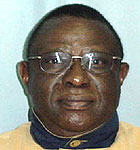Related Research Articles

The International Criminal Tribunal for Rwanda was an international court established in November 1994 by the United Nations Security Council in Resolution 955 in order to adjudicate people charged for the Rwandan genocide and other serious violations of international law in Rwanda, or by Rwandan citizens in nearby states, between 1 January and 31 December 1994. The court eventually convicted 61 individuals and acquitted 14.

Théoneste Bagosora was a Rwandan military officer. He was chiefly known for his key role in the 1994 Rwandan genocide for which he was sentenced to life imprisonment by the International Criminal Tribunal for Rwanda (ICTR). In 2011, the sentence was reduced to 35 years' imprisonment on appeal. He was due to be imprisoned until he was 89. According to René Lemarchand, Bagosora was "the chief organizer of the killings". On 25 September 2021, he died in a prison hospital in Mali, where he was being treated for heart issues.
Augustin Bizimungu is a former general of the Rwandan Armed Forces (FAR). On 16 April 1994, at the start of the Rwandan genocide, he was appointed chief of staff of the army and promoted to the rank of major general.

Pauline Nyiramasuhuko is a Rwandan politician who was the Minister for Family Welfare and the Advancement of Women. She was convicted of having incited troops and militia to carry out rape during the Rwandan genocide of 1994. She was tried for genocide and incitement to rape as part of the "Butare Group" at the International Criminal Tribunal for Rwanda (ICTR) in Arusha, Tanzania. In June 2011, she was convicted of seven charges and sentenced to life imprisonment. Nyiramasuhuko is the first woman to be convicted of genocide by the ICTR, and the first woman to be convicted of genocidal rape.
Protais Zigiranyirazo commonly known as Monsieur Zed, is a Rwandan businessman and politician and was governor of the Ruhengeri prefecture in northwestern Rwanda from 1974 to 1989. Zigiranyirazo was a member of the Akazu, an elite circle of relatives and friends of former President Juvénal Habyarimana who pushed the Hutu Power ideology.
Jerome Clement Bicamumpaka is a Rwandan politician. He is one of the 402 co-founders of the Rwandan political party MDR, a democratic opposition party, created in Kigali on July 1, 1991. He was born on November 4, 1957, in Mukono (Rwaza), in Ruhondo commune, Ruhengeri prefecture.
Simon Bikindi was a Rwandan singer-songwriter who was formerly very popular in Rwanda. His patriotic songs were playlist staples on the national radio station Radio Rwanda during the war from October 1990 to July 1994 before the Rwandan Patriotic Front took power. For actions during the april 1994's genocide against Tutsi, he was tried and convicted for incitement to genocide by the International Criminal Tribunal for Rwanda (ICTR) in 2008. He died of diabetes at a Beninese hospital in late 2018.
Félicien Kabuga is a génocidaire and Rwandan businessman who played a major role in the run-up to the Genocide of the Rwandan Tutsis. A multimillionaire, he was closely connected to dictator Juvénal Habyarimana's Hutu nationalist MRND party and the Akazu, an informal group of Hutu extremists who helped lead the Rwandan genocide.
Ildephonse Hategekimana is a Rwandan soldier who participated in the Rwandan genocide.
Callixte Nzabonimana is a former Rwandan politician who is accused of participating in the Rwandan genocide.

Protais Mpiranya, also known as Sambao Ndume, was a Rwandan war criminal who was internationally wanted for his alleged role in the Rwandan genocide. Regarded as Rwanda's most wanted fugitive, he was described in 2022 as "one of the world’s most brutal killers", and was internationally recognised as the most sought génocidaire.
Augustin Ndindiliyimana is a former Rwandan General and Chief of the Rwandan National Gendarmerie. He was convicted of genocide by the International Criminal Tribunal for Rwanda but he was acquitted by the tribunal upon appeal.

Édouard Karemera was a Rwandan politician who was convicted of genocide in 2011 after being apprehended in 1998.
Innocent Sagahutu is a former Rwandan soldier, who is chiefly known for his role in the Rwandan genocide.
François-Xavier Nzuwonemeye is a former Rwandan soldier, who is chiefly known for his role in the Rwandan genocide.
The United Nations Detention Facility (UNDF) is a United Nations detention center located in Arusha in Northern Tanzania. The other one is the United Nations Detention Unit in The Hague, Netherlands. The facility is maintained by the International Residual Mechanism for Criminal Tribunals (IRMCT), a UN organization.

Grégoire Ndahimana is the former mayor of Kivumu, Rwanda. Indicted and arrested for alleged war crimes by the International Criminal Tribunal for Rwanda (ICTR), Ndahimana is thought to be one of the key figures in the 1994 Rwandan genocide, and is claimed to have had up to 6,000 Tutsi killed. In 2013, he was convicted of genocide and crimes against humanity and sentenced to 25 years in prison.

United Nations Security Council resolution 955, adopted on 8 November 1994, after recalling all resolutions on Rwanda, the Council noted that serious violations of international humanitarian law had taken place in the country and, acting under Chapter VII of the United Nations Charter, established the International Criminal Tribunal for Rwanda (ICTR).
Joseph Nzirorera was a Rwandan politician and accused génocidaires who was arrested by the International Criminal Tribunal for Rwanda (ICTR) for his role in the Rwandan genocide.
References
- ↑ Key Rwandan genocide trial begins, BBC News , 6 November 2003.
- ↑ Indictment against Bizimungu Archived 2020-07-30 at the Wayback Machine from the ICTR.
- ↑ ICTR/Calendar - Eight trials set for March 2006, Reuters AlertNet, March 2, 2006.